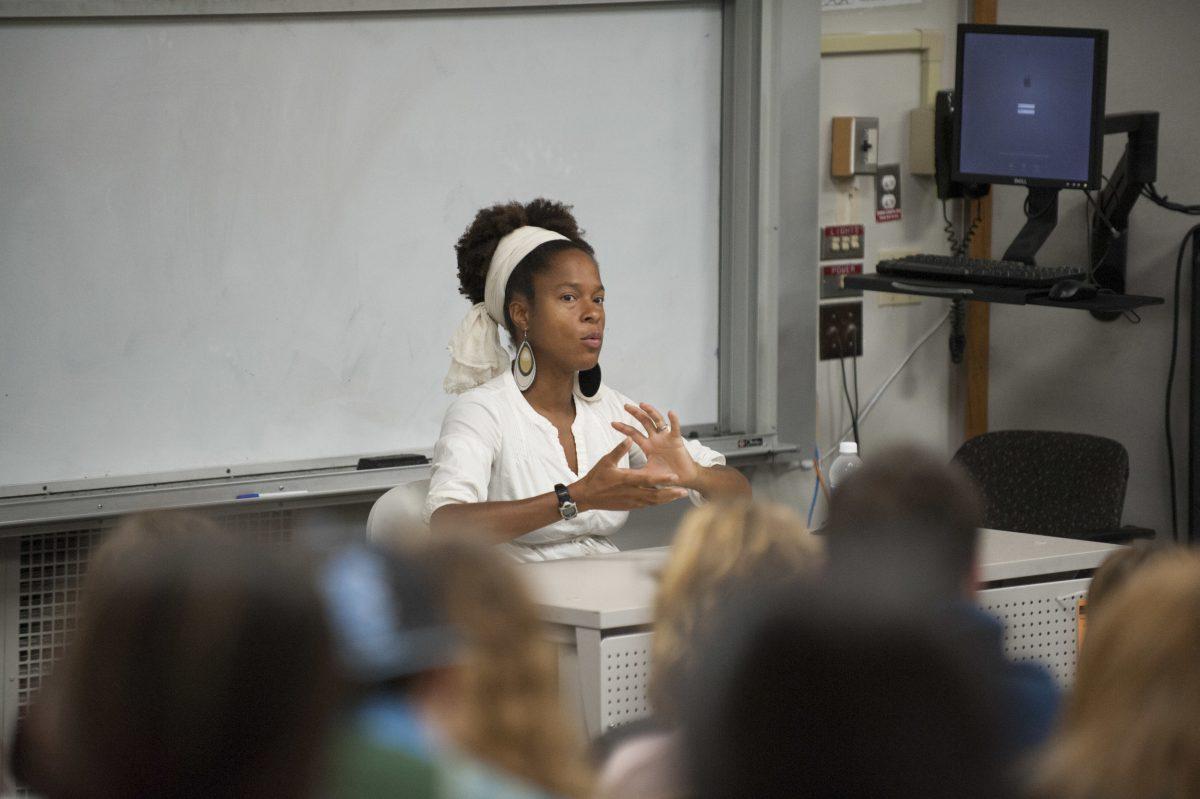“An apple a day keeps the doctors away. That doesn’t just come from nowhere,” said A. Breeze Harper, who holds a doctorate in geography.
It may be difficult to ignore the fries at Zinfandel cafeteria or fast food joints, but in the lecture, “Creating Critical Consciousness through Veganism,” Harper elaborated on how the classification of one’s identity could trigger certain eating habits.
She spoke of her recent research as one of the founders of “The Sistah Vegan Project,” and demonstrated the many ways in which veganism is represented by such a small percentage of people.
The movement concentrates on how veganism links to the history of African Americans in colonial times and the lack of privileges there were then. This history is then juxtaposed to today’s issues of black feministic health.
It seems as though veganism only appeals to a particular group of people. These people all seem to fit under the same categorizations, all-coming from equal gender, race and class standing.
“Middle class assumptions are very problematic to me,” said Harper.
According to Harper, a vegan can be stereotyped as one who is predominately middle class, white, straight, Christian, economically privileged and an animal rights activist.
This way of classifying vegans is misconstrued and doesn’t allow everyone to be part of such healthy lifestyles.
With a degree from Dartmouth College and Harvard University, she works towards finding research that allows her to figure out the union between geographic locations, food and race, mainly concentrating on black feminism and theories of race.
She began her journey at Dartmouth College in Hanover, NH in the early ‘90s. Of course with the majority of the student body classifying as white, as an African American female she often stood out in the crowd. Racial slurs were of the norm.
“It was an incredibly hostile environment for anyone that wasn’t white,” said Harper.
As her anxiety grew, she said that the “racist micro-aggression” caused her to have heavy symptoms of insomnia. She ate junk food as comfort foods. In return, she later experienced life-threatening issues.
At the age of 23 she was diagnosed with fibro-tumors, as well as experiencing reproductive health issues, not to mention eczema on her leg. In hopes to receive aid she went to a gynecologist.
However, she received little help as her doctor told her that her symptoms were common as many black women experience the same.
“I felt like I was just a statistic,” said Harper.
She learned from a friend about a book called, “Sacred Women,” that elaborates on the idea of Afro-Sacred Veganism.
The book served as a revelation as to why women of color in particular are so prone to disease and misfortune in the history of their health.
She learned that colonial times are to blame. Slavery plays a crucial role in black women’s health today. This is because it immediately places women of color in a low socioeconomic standing.
A black woman faces stereotypes such as being from a poor background, unprivileged and submissive. Sitting at such low standards, walking into a Whole Foods Market and buying quality food could feel like no easy task.
“Colonialism has brainwashed ourselves to believe capitalism and exploitation is normal,” said Harper.
She continued to speak of the stereotypes given to a persona of a vegan lifestyle, which are so one-dimensional, those who do not meet that exact criteria look to fit somewhere else.
Harper hopes to expand the net of distinct cultures, genders and the whole hierarchy of economic statuses because in the end human health is most important.
As a black feminist and vegan activist, she said that her healthy lifestyle has in fact cured her tumor, her eczema and allowed her to successfully conceive three children.
To learn more about Harper’s research and movement, visit her blog at sistahvegan.com.
In addition, check out her book “Sistah Vegan,” which gives a more in-depth analysis on how race and gender are linked to the practice and familiarity of veganism in the USA.



































